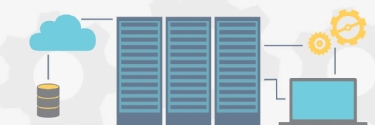Data centers
Definitions used in data center management, including hardware, virtualization and cloud computing.

Data backup and disaster recovery
Terms related to backup and recovery, including definitions about making copies of data and words and phrases about restoring original data after a data loss event.
-
What is off-site backup?
Off-site backup is a method of backing up data to a remote server or to media that's transported to another physical location.
-
What is a backup storage device?
A backup storage device is a hardware component that stores duplicate copies of data.
-
What is a forensic image?
A forensic image (forensic copy) is a bit-by-bit, sector-by-sector direct copy of a physical storage device, including all files, folders, and unallocated, free and slack space.
Data center management
Terms related to data centers, including definitions about network operations centers (NOCs) and words and phrases about the storage, management and the transmission of data.
-
What is a configuration management database?
A configuration management database (CMDB) is a file -- usually in the form of a standardized database -- that contains all relevant information about the hardware and software components used in an organization's IT services and the relationships among those components.
-
data center infrastructure efficiency (DCiE)
Data center infrastructure efficiency (DCiE) is a metric used to determine the energy efficiency of a data center by measuring what percentage of total facility power is consumed by IT equipment.
-
unified computing system (UCS)
A unified computing system (UCS) is a converged data center architecture that integrates computing, networking and storage resources to increase efficiency and enable centralized management.
Linux
Definitions related to Linux, including tech terms about open source and words and phrases about Linux distributions and software development.
-
What is Linux distros (Linux distribution)?
A Linux distribution -- often shortened to 'Linux distro' -- is a complete operating system based on Linux.
-
What is Hyperledger?
Hyperledger is a collection of open source projects created to support the development of blockchain-based distributed ledgers.
-
What is the principle of least privilege (POLP)?
The principle of least privilege (POLP) is a concept in computer security that limits users' access rights to only what is strictly required to do their jobs.
Operating systems
Definitions related to operating systems, including tech terms about open source and proprietary operating systems and words and phrases about system programs, boot mechanisms, kernels, command interpreters, DLL libraries and drivers.
-
What is defragmentation?
Defragmentation, also known as 'defragging' or 'defrag,' is the process of rearranging the data on a storage medium, such as a hard disk drive (HDD), to ensure efficient storage and access.
-
What is iCloud?
Apple's iCloud is a free service that stores subscribers' photos, videos, documents, apps and more and updates everything across users' synced devices.
-
What is a mobile operating system?
A mobile operating system (OS) is software that enables smartphones, tablets and other devices to run applications and programs.
Storage Admin
Terms related to data storage management, including definitions about enterprise storage and words and phrases about storage infrastructure, storage capacity and hierarchical storage management (HSM).
-
What is unified storage? Features, pros/cons, comparison to block/file storage
Unified storage, sometimes called network unified storage (NUS) or multiprotocol storage, is a storage system that combines block and file storage and enables users to run and manage files and applications from a single device.
-
What is a SAN switch? How it works and compares to other network switches
A SAN switch (storage area network switch) is a device that connects servers and shared pools of storage devices and is dedicated to moving storage traffic.
-
What is defragmentation?
Defragmentation, also known as 'defragging' or 'defrag,' is the process of rearranging the data on a storage medium, such as a hard disk drive (HDD), to ensure efficient storage and access.
Storage and Data Mgmt
Definitions about storage and data management including backup/recovery vocabulary, business intelligence terminology, storage area networks and database management.
-
What is a configuration management database?
A configuration management database (CMDB) is a file -- usually in the form of a standardized database -- that contains all relevant information about the hardware and software components used in an organization's IT services and the relationships among those components.
-
What is off-site backup?
Off-site backup is a method of backing up data to a remote server or to media that's transported to another physical location.
-
What is a backup storage device?
A backup storage device is a hardware component that stores duplicate copies of data.
Virtualization
Terms related to virtualization, including definitions about virtualization technologies and words and phrases about server virtualization, desktop virtualization and storage virtualization.
-
What are virtual agents and how are they being used?
A virtual agent is an AI-powered software application or service that interacts with humans or other digital systems in a human-like manner, most often using natural language.
-
What is desktop as a service (DaaS)?
Desktop as a service (DaaS) is a cloud computing offering in which a third party hosts the back end of a virtual desktop infrastructure (VDI) deployment.
-
unified computing system (UCS)
A unified computing system (UCS) is a converged data center architecture that integrates computing, networking and storage resources to increase efficiency and enable centralized management.